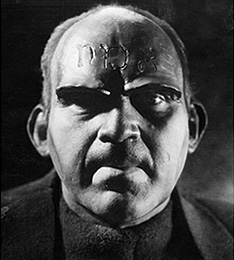
Things are going very badly in the Jewish ghetto of Prague. The people cry out for Rabbi Jacob (Charles Dorat) to bring the fabled golem to life so save them, but he says it isn’t yet time. Emperor Rudolph II (Harry Baur) also has the golem on his mind as he’s heard the prediction that it will bring about his downfall, a fact that Chancellor Lang (Roger Karl) uses to his own advantage. When the golem disappears, Rudolph has Jacob arrested—though not before he can pass on the secret of revivifying the golem to his wife, Rachel (Jany Holt)—and tortured, but Jacob doesn’t know what happened to the clay statue. It was actually Rudolph’s rightfully jealous mistress, Countess Strada (Germaine Aussey) who had the golem moved into the castle. She befriends a French conman/swordsman, Trignac (Roger Duchesne), who is rescued by Rachel causing the conman to get Jacob out of the dungeon. But by now all of the Jewish leaders are to be killed, and only the golem can save them.
Le Golem (titled The Man of Stone for the US, even though it should be The Man of Clay), is a reworking, rather than remake, of the Golem story that had already seen three films. It was meant as an international picture to be made in multiple languages and shot in Germany. It was moved to Czechoslovakia when someone worked out that 1936 Germany might not be the best place to make a Jewish-themed film.
Although always discussed as horror, the Golem story walks the edge between Frankenstein and a superhero tale, though in this case, it is more of a costume drama/costume comedy/religious lesson with a little bit of Samson tossed in at the end. That is to say, it’s a mess, but it is a very well made and pretty mess. It looks good, and the actors are all dedicated to whatever type of film they think they are in.
For the basic story, Jacob and Rachel should be the leads. And they are in a serious religious picture. Very serious and scared. Dorat and Holt do a fine job in what comes close to a religious service. There is no fun to be had when they are on screen; fun would be out of place.
But director Julien Duvivier doesn’t seem all that interested in that story. Instead, he focuses the picture on Rudolph and his slipping sanity, and the palace intrigue that goes on around that. This is mostly a lighter story, one that swings into satire. Rudolph does get a majority of the screentime. But if this is the focus, than Jacob and Rachel’s time should be cut way back, or perhaps the entire golem story should be cut in favor of more wheeling and dealing at court. The two parts certainly have a hard time fitting together. At the very least the torture needs to be less horrific in a satire. And Rudolph needs to be a serious evil force for a faith picture.
Then there is Countess Strada and Trignac, who are in a romantic adventure comedy. They are an amiable pair and probably the only ones you’d want to spend any time around but it is hard to fathom what they are doing in this picture. Perhaps there was a draft where they are the protagonists and heroes as it looks like they will be at one point, but that seems a horrible idea for a Jewish religious film.
Then again, horrible ideas define this movie. There is a lot of talent in front of and behind the camera, but no one seems to know what they are making.
And if you waiting for the golem, you’ve got a lot of waiting to do. He doesn’t move until the last ten minutes of the movie, where he just looks like a guy. It is another problem for the film that he isn’t awakened sooner as all of the suffering could have been prevented. Why wasn’t he? Well, when the film is in full religious fervor-mode, you can just put it down to God. Of course that makes God a real dick, but we’ve seen that before. But as the film so often abandons the holy tone, that answer doesn’t feel right. Put it down to yet another horrible idea.
Perhaps the script was being shuffled around at the last minute to deal with real world issues. Certainly I would have made more commentary on Nazi Germany and what was happening to the Jews there, and some of that is in the film, but not enough, and not with a clear message.